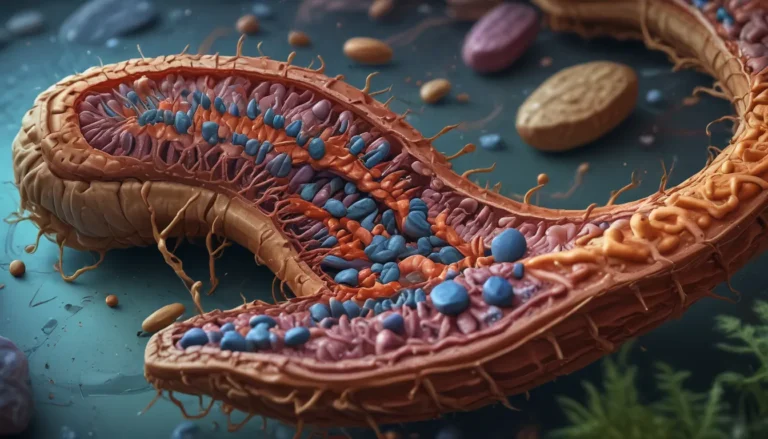A Note About Images: The images used in our articles are for illustration purposes only and may not exactly match the content. They are meant to engage readers, but the text should be relied upon for accurate information.
In the intricate web of life on Earth, there’s a group of organisms that often goes unnoticed but plays a vital role in sustaining ecosystems – decomposers. These unsung heroes are responsible for breaking down organic matter, like dead plants and animals, and returning essential nutrients back into the environment. In this article, we’ll uncover 19 fascinating facts about these overlooked creatures, shedding light on their importance in nutrient cycling and their incredible diversity.
Unveiling the Secrets of Decomposers
Decomposers, ranging from bacteria to fungi and insects, are nature’s recyclers, breaking down almost anything from leaves to dead animals and even pollutants. Through their invaluable work, they contribute to the stability and health of ecosystems worldwide, helping new life to flourish by recycling nutrients and breaking down waste.
The Vital Role of Decomposers in the Ecosystem
Decomposers are like nature’s cleanup crew, breaking down dead organic matter and recycling nutrients back into the soil. Without them, the environment would be overwhelmed with waste, and essential nutrients would be trapped in decomposing organisms. They play a crucial role in maintaining the balance of ecosystems and ensuring the health of the environment.
The Marvel of Nutrient Cycling with Decomposers
Through the process of decomposition, decomposers release carbon dioxide back into the atmosphere, completing the carbon cycle. By breaking down complex organic compounds into simpler forms, they release carbon stored in dead organisms back into the environment. Additionally, decomposers break down dead organic matter into simpler forms, releasing essential nutrients back into the soil for plants to absorb and use for growth.
The Remarkable Abilities of Decomposers
Decomposers possess the incredible ability to break down a diverse range of organic matter, including leaves, wood, dead animals, and even synthetic materials. Equipped with specialized enzymes, they can break down complex compounds, making them key players in waste management and bioremediation efforts.
The Ubiquity of Decomposers in Every Ecosystem
From lush rainforests to barren deserts, decomposers can be found in every corner of the world. They adapt to various environmental conditions and are essential for the functioning of ecosystems worldwide. Their presence ensures the recycling of nutrients and the maintenance of ecosystem balance.
The Diversity Among Decomposers
Decomposers encompass a wide range of organisms, from bacteria and fungi to worms, insects, and scavengers. Each organism plays a unique role in the process of decomposition, contributing to the overall efficiency of nutrient recycling and waste management in ecosystems.
The Contribution of Decomposers to Soil Formation
As decomposers break down organic matter, they enrich the soil with nutrients, create pore spaces for water retention, and enhance soil structure. This process not only contributes to soil fertility but also plays a crucial role in maintaining healthy and productive ecosystems.
The Economic Importance of Decomposers
Decomposers play a significant role in industries such as composting and waste management by converting organic waste into nutrient-rich compost. This reduces the need for chemical fertilizers, promoting sustainable agriculture practices and environmental conservation.
The Role of Decomposers in Disease Prevention
Decomposers play a vital role in preventing the spread of diseases by rapidly breaking down dead organisms, including those that may carry harmful pathogens. By limiting the potential for disease transmission within ecosystems, they contribute to overall ecosystem health.
The Symbiotic Relationships of Decomposers
Some decomposers form symbiotic relationships with other organisms, such as mycorrhizal fungi that associate with plant roots to aid in nutrient uptake and enhance plant growth. These mutually beneficial interactions contribute to the overall health and productivity of ecosystems.
The Surprising Habitats of Decomposers
While decomposers are commonly associated with forests and soil, they can also be found in aquatic environments. Aquatic decomposers, including aquatic fungi and bacteria, play a crucial role in breaking down dead plants and animals, contributing to nutrient recycling in freshwater and marine ecosystems.
The Ancient Origins of Decomposers
Decomposers are ancient organisms that have been cycling nutrients on Earth for billions of years. Their presence and activity have shaped the composition of ecosystems throughout history, highlighting their essential role in maintaining the balance of life on our planet.
The Resilience of Decomposers in Extreme Conditions
Some decomposers exhibit remarkable resilience and can survive in extreme environments, such as deep-sea sediments, hot springs, and freezing temperatures. Their ability to adapt to challenging conditions enables them to continue their vital role in the decomposition process across diverse habitats.
The Environmental Benefits of Decomposers
Decomposers possess the unique ability to break down organic pollutants in the environment through biodegradation. This process helps reduce the impact of harmful substances on ecosystems and human health, contributing to environmental sustainability and conservation efforts.
The Integral Position of Decomposers in the Food Chain
Decomposers occupy a critical position in the food chain, completing the final stage of the energy transfer process. They convert the remains of dead organisms into energy and nutrients that are then consumed by scavengers, detritivores, and other organisms, sustaining the flow of energy and resources within ecosystems.
The Stability Provided by Decomposers in Ecosystems
By efficiently recycling nutrients and breaking down organic matter, decomposers contribute to the overall stability and functioning of ecosystems. They help maintain a balance between the production and decomposition of organic material, ensuring the continuous flow of energy and resources necessary for ecosystem health.
The Role of Decomposers in Ecological Succession
During ecological succession, decomposers facilitate the breakdown of dead material, paving the way for new organisms to colonize the area. Their work is crucial in transforming barren landscapes into thriving, biodiverse habitats, showcasing the importance of their role in ecosystem regeneration.
The Forensic Applications of Decomposers
Forensic scientists rely on decomposers to aid in determining the time since death in investigations. The activity of decomposers on human remains can provide valuable insights and information that are crucial in forensic science, highlighting the diverse applications of these remarkable organisms.
Acknowledging the Marvels of Decomposers
In conclusion, decomposers are unsung heroes in the intricate web of life on Earth, playing a critical role in breaking down organic matter and recycling nutrients back into the environment. From bacteria and fungi to worms and insects, these fascinating organisms contribute to nutrient cycling, soil formation, and disease prevention, showcasing their essential role in sustaining life on our planet. By understanding and appreciating the importance of decomposers, we can better grasp the interconnectedness of all living organisms and the delicate balance of nature.
FAQs About Decomposers
Q: What are decomposers?
A: Decomposers are organisms that break down dead plant and animal matter into simpler substances, such as water, carbon dioxide, and nutrients.
Q: What examples of decomposers exist?
A: Some common examples of decomposers include bacteria, fungi, earthworms, beetles, and other insects.
Q: What is the role of decomposers in the ecosystem?
A: Decomposers play a crucial role in the ecosystem by recycling nutrients, breaking down organic matter, and facilitating the return of essential elements to the environment.
Q: How do decomposers aid in nutrient recycling?
A: Decomposers break down organic matter into simpler substances, releasing nutrients back into the soil, which can then be absorbed by plants and used by other organisms in the food chain.
Q: Can decomposers be harmful to humans?
A: While some decomposers can cause diseases in humans, most decomposers are not harmful and actually contribute to maintaining a healthy and balanced ecosystem.
Q: Can decomposers be found in different habitats?
A: Yes, decomposers can be found in various habitats, including forests, grasslands, oceans, and even urban environments.
Exploring the Marvels of Ecology
Decomposers are just one piece of the incredible world of ecology. If you’re intrigued by how organic matter breaks down and returns to the earth, our article on biodegradation offers a wealth of information. Flies, often overlooked, play a significant role in decomposition and possess surprising traits worth exploring. And for those captivated by the power of worms, our piece on red worms will leave you amazed at their abilities. Each of these topics provides a unique glimpse into the complex and interconnected web of life on our planet.
Inspiring Learning and Discovery
Our commitment to delivering trustworthy and engaging content lies at the core of what we do. Every fact on our site is contributed by real users like you, bringing a wealth of diverse insights and information. Our dedicated editors meticulously review each submission to ensure the highest standards of accuracy and reliability. Trust in our commitment to quality and authenticity as you explore and learn with us, discovering the wonders of the natural world and the marvels of decomposition.






